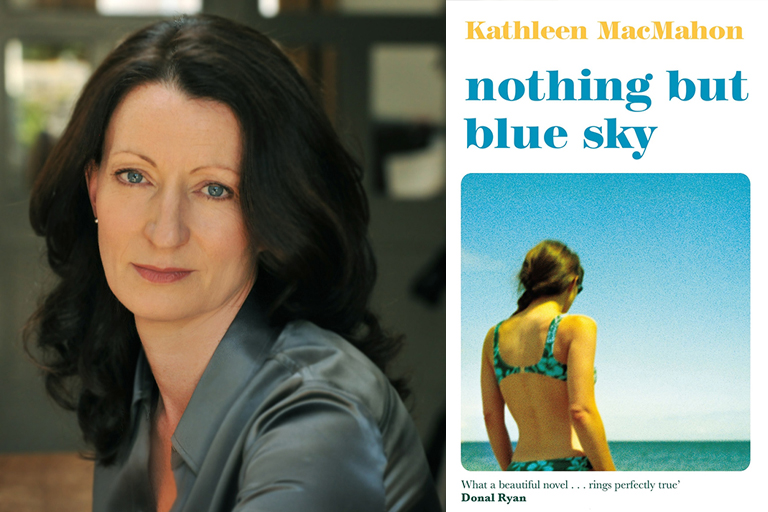Our inaugural Discoveries winner, powered by NatWest and Curtis Brown, was Emma van Straaten.
Emma beat over 2,300 entries to become the Discoveries 2021 winner with her accomplished psychological debut, Heartstring, about a cleaner who becomes obsessed with her client’s life. Meet her below and scroll on for an extract of Heartstring.
As the winner of the programme, Emma receives a £5,000 cheque and a desk to write at her local NatWest Accelerator Hub.
What initially inspired your novel-in-progress?
“When I first moved to London, I became a casual cleaner for a couple who lived in the same block of flats as me. I’d advertised in the communal post-room, and after a five-minute interview with Sarah, was hired to pop round twice a week. They left cash on the counter, and communicated by the odd note, so I never saw her again, and never met her husband at all.
Arriving often minutes after they’d left for work, it wasn’t long before I felt I knew them. Their surroundings seemed to give me clues as to their personalities and I grew oddly fond of them. I began making all sort of involuntary judgements and assumptions from this strangely intimate relationship I had with their belongings, as I washed up their breakfast bowls, straightened the books on their bedside tables and folded their clothes. They eventually moved away (which I’d known would happen because of the twelve-week pregnancy scan that appeared on their corkboard and the subsequent estate agent brochures spread on their kitchen counter), but the experience stayed with me.
Several years later, I signed up for an evening creative writing course for which I wrote a short story, drawing on this uneasy knowingness. My classmates found my depiction of an obsessive cleaner who blindly loves the inhabitant of a flat she cleans unsettling. I wanted her story told more fully, her fixation made more frightening, so I started writing Heartstring.”
Which woman writer inspires you most and why?
“This is an impossible question! I am inspired by so many. I think I’d have to say Margaret Atwood, for the sheer richness and depth of her literary career, the beauty and imagination of her writing which I have loved since childhood, and the willingness and ease with which she defies genre, to great success. This flexible attitude to genre is also why I admire authors Sarah Waters and Tana French, who write so magnificently and purposefully, thwarting any expectation a reader might have about historic fiction or crime writing. I welcome the attitude that all types of writing can be beautiful.”
How have you found the Discoveries programme?
“I am so grateful that the Discoveries programme came along when it did – just at the right time, when I was doubting my writing and wondering how to further shape my manuscript. I imagine it was the perfect time for many pandemic writers! I took the submission requirement of 10,000 words and a synopsis as the chance to really re-examine what I had written so far, and told myself that even if nothing came of it, looking at my words afresh would give me the motivation I needed to keep going.”
Read an extract of Emma’s winning debut Heartstring:
The key catches in the lock but I know the trick; a swift twist and I open the door, inwards, shoulder finding the worn spot His shoulder must do, and I am struck by the warm, rich scent of Him, salty as blood, and I am afraid as I am each week, that something has changed, more than the seasonal shiftings of cotton to wool, canvas shoes to suede, glossy leather, doormat thick with envelopes bearing cheques from aunts and festive greetings. I set my bucket down, just inside, filled in technicolour haphazardness with bottles and two-textured sponges and, like a bloodhound, no, a spaniel, melting-eyed and caramel, I seek sugary florals in the air; check that no second toothbrush, pink, lolls in the marble tooth-mug; no twin wine glasses on the kitchen counter or on the low table, jammy residue thickening acidly, or, even worse, prim matching mugs silty with morning coffee and shared murmurings. He is alone, and my heart squeezes crushingly tight with love as I hold my breath with leaden air and dispose of it. You think you know what love is, I imagine, but you don’t. It’s not holding hands, and feeling safe, fond smiles and tender kisses, bringing home silk-petalled flowers on a Friday, picking up that green and bone-dry wine you know he likes. I spit on that. Love is this: when it is your greatest desire to slice open His chest and crawl inside Him to rest. It is drinking His blood, great copper gulps of it, and pressing yourself to Him, limb to limb, palm to palm so that you might be absorbed. Burrowing inside His bones, becoming His very marrow. It is disappearing entirely into Him. This is the way I love Him, and the way He must surely love me.
Surely, surely I say, because we have not met, face to face, that is, although our correspondence is lengthy and a meeting of true, true minds. I clean His small one-bedroom flat once a week and I know every inch of it and so every inch of Him, that hard body. He likes Radio 4, set to a volume where the white male voices whisper conspiratorially. He watches The Wire again and again, looping through season after season, spring to summer, subtitles on to hear over the foamy brushing of His teeth, the buzz of His razor, carelessly showering apostrophes, semicolons. His eyelashes, discarded wishes, fit so dearly to the curve of my fingertip that I cannot bear to blow them away. I touch them to my tongue and press them to my eyelids, rather than watch them shiver into the air. He cycles to work when it isn’t raining, and His shampoo smells like heady rosemary and lavender: like Provence does, I imagine, in late summer, drowsy bees and His hair, tousled, just stirring in a breeze. His fingerprints are universes. He has an insufferable older sister and a doughy baby niece with raisin eyes and very little hair, the lack thereof often accentuated by a desperate bowed headband and pink knickerbockers: look, she’s a girl. He is myself, cast into a different mould. And so it is each time I roll my hair into a knot, push up my sleeves and work carefully, lovingly: smoothing, wiping, plumping, sweeping. I lick the floor clean. I run my hands over the fabric of the place, the bones of Him. I bury my face into His pillow and sometimes I am moved to tears by the hollow that His body has left under the duvet that still exhales the smell of Him. I carefully fit myself into it, seeking the last vestiges (do I imagine them?) of sleep-warmth and close my eyes. I am a cat, curled. The morning sun, already hot, strokes my eyelids with a rosy luminescence and I imagine John Donne, dark-eyed and neatly bearded, limbs tangled with his lady love, chastising that great star for gazing through the curtains at them, ending their ardent night.








